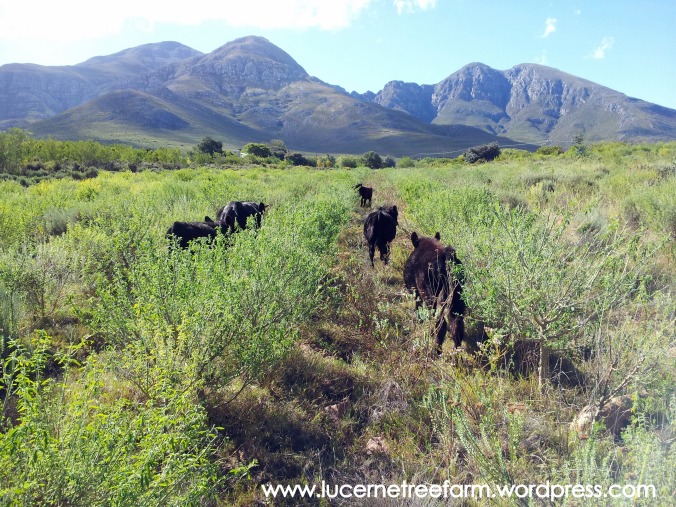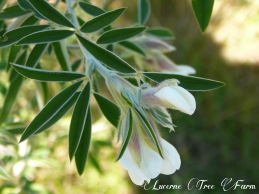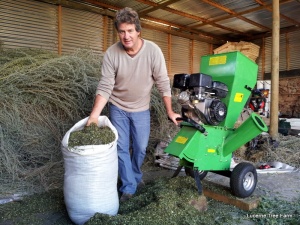When I started Practical Pages, I did not plan for it to be a personal blog. And generally it isn’t … the names and faces of the innocent are protected , and some family members never feature. But as I’ve emailed, chatted to and met some of my readers (thank you so much for the visit), I realized that it is personal. My passion is to inspire and encourage others, and that is personal.
Many of you may know these facts about me ~
- We live in South Africa, on a farm in the Klein Karoo, Western Cape where fynbos & protea naturally grow.
- We live on a very remote mountain farm, with fresh air and pure mountain water.
- We organically farm fruit trees, Dorper sheep, black Angus cattle and some free range pigs and chickens.
- We live simple, homestead lives, growing, harvesting, preserving and cooking much of our own organic food, hand-milking our Jersey cow which I use to make cheeses, yogurt and butter.
- And we grow Lucerne Trees
 Now, I’m sure you’re thinking, “What is a lucerne tree?”
Now, I’m sure you’re thinking, “What is a lucerne tree?”
Tree Lucerne is also known as Tagasaste, (Chamaecytisuspalmensis), and originally came from the Canary Islands. The Lucerne tree is a a member of the legume family, a highly nutritious plant, exactly like normal lucerne (alfalfa), except with no danger of bloat and it is a tree that grows for up to 40 – 60 years!
 When our fields of lucerne trees flowered and yielded harvests of millions of seeds in pods, we officially launched our business — the Lucerne Tree Farm. Our aim is to share our farming strategies and success with others so that farmers, bee-keepers, permaculturalists gardeners can also enjoy the wonderful benefits of these trees,
When our fields of lucerne trees flowered and yielded harvests of millions of seeds in pods, we officially launched our business — the Lucerne Tree Farm. Our aim is to share our farming strategies and success with others so that farmers, bee-keepers, permaculturalists gardeners can also enjoy the wonderful benefits of these trees, 
 We are all involved in our family business. My hubby runs the farm, creates infra-structure and plants out thousands of trees, prunes and chips trees for fodder, and prepares trees to sell to clients. We hand-pick, sift and package all our seeds. We plant out thousands of seeds into seed-trays or potting bags and care for the seedlings. We cut and chip our trees for wet or dry feed. I created our business blog and I do all the admin, marketing, orders and packaging and telephonically assist clients.
We are all involved in our family business. My hubby runs the farm, creates infra-structure and plants out thousands of trees, prunes and chips trees for fodder, and prepares trees to sell to clients. We hand-pick, sift and package all our seeds. We plant out thousands of seeds into seed-trays or potting bags and care for the seedlings. We cut and chip our trees for wet or dry feed. I created our business blog and I do all the admin, marketing, orders and packaging and telephonically assist clients.
Please will you pop over for a quick tour of our little website. You can order, ask questions or request a quote on our contact form on the Prices & Orders page.
Thanks for letting me share a more personal peep into our farm life.
Blessings, Nadene
Pingback: Timing myself! | Practical Pages
Pingback: Timing myself! | Practical Pages
Can we get the tree in Botswana and how much do you think it can cost for a hectare.
Benito
LikeLike
@Benito, you will find all the prices and planting information on our Lucerne Tree Farm website. We send seeds to Botswana,but not trees, due to import regulations.
LikeLike
Hi Nadene, many thanks for the good news you whrote on the treelucern that grows in sa. When I go into any treelucern site in sa the only pictures I see is the same Australian ones the guys pull of the internet, but I see theyrs hope. Whant to know, myself I’m a merino sheep farmer in Rustenburg North West area and would like to settle 20 hectares with this amazing fodder, but is theyr a diferens between sheep and cow type and what is the risks from the seedling til it go into the ground. Nobody had any sucses in this area and I am to scared to plant this ones that I have if theyrs a tric to it. I baught 6000 seeds for a start and they said theyr is no diferens cow sheep the same. I would like to hear from you because you seems like a woman with integraty and with CHRISTIAN values. ( sorry for the english spelling). Thanks Hennie
LikeLike
@Hennie, thanks for your comment and questions. Here are brief answers for readers who may want to know what I emailed to you:
1. We use normal “cattle” lucerne trees and cut them to 1.5m for sheep. There are no sheep lucerne seeds or trees available (that we can find).
2. Seedlings will need to be protected from all animals and insects that eat these delicious trees while small. Put up shade cloth around your field to keep rabbits, buck and other animals out. Use old re-cycled irrigation pipe around the tree stems to stop mice ring-barking the trees.
3. Once the tree is 2 years old or at least has a woody stem about 2cm thick, they will bounce back after grazing.
4. Prepare small batches of seed (a 100 at a time) for germination and follow our step-by-step instructions on our blog.
5. Pot out seedlings and protect in a sheltered area till spring.
This tree is a pioneer plant and should do well in your area. May God bless your endevours.
LikeLike
Pingback: Foreign Language the CM Way | Practical Pages
Pingback: Lucerne farms | Gwinnettgas
Your website has been really encouraging for me. I am a South African living in the USA and it has been so lovely to get your perspective on homeschooling. I have used a number of your pages and my daughter is really enjoying them. So lovely to hear your values and see your family and your business. Even though you are so far away I feel a little connected in that our values are so similar. Always lovely to find out that you are not the only one who feels certain things are important… even though they may not be ‘normal’ 🙂 Bless you and your family in your new enterprise, look forward to hearing more of how things develop for you all.
LikeLike
Pingback: Introducing Nadene | Homeschool HUB
Pingback: Introducing Nadene | Practical Pages
Pingback: Stresses and Struggles | Practical Pages
Hi just like others I stumbled upon your site, looking for South African handwriting worksheets for my girls. I got so much more, thank you. We are currently looking to buy a small holding in the Cape to live a self sustaining lifestyle with our family. So as you see I got so much more. thank you and Blessings
LikeLike
@Dawn, Welcome to Practical Pages and all the Lord’s blessings as you look for the land to live out your dreams. We took about 18 months before we found our farm and it was such an adventure!
LikeLike
Nadene,
Do you or your sheep eat the leaves? I was a little confused as to whether they were food trees for your family or for your sheep.
Christine
LikeLike
@Christine, lucerne is a plant food for grazing animals such as cattle, sheep and horses. We cultivate it for our sheep. I must post some photos of our sheep grazing the trees 🙂
LikeLike
Oh, how I miss my childhood home. I grew up in Calvinia where we farmed with dorpers and my dad planted lucern. My parents still live there, but are no longer farmers. I’m not too far from them in Cape Town and will go and visit soon!
I’m glad I stumbled across your blog, as I just started out with homeschooling. I will have to make time to peruse the pages in search for much needed inspiration, especially on the Charlotte Mason method.
Thank you for sharing.
LikeLike
@Karen, welcome here and thanks for your friendly comment! May you be inspired and encouraged!
LikeLike
I love the new website and think the Lucerne looks lovely! Thanks for sharing a little glimpse into your life with us. I am so blessed by your blog here. We just started homeschooling our 7 year old in January and I’ve used your blog as a source of inspiration and guidance. In particular, our son loves the “cat” handwriting pages! Thank you!!
LikeLike
@Kristin, thank you for your kind comments and I’m delighted your son enjoys using his handwriting chart!
LikeLike
Thank you so much for a glimpse into your family lives! I lived in Southern Africa for 3+ years and loved it. I really miss the protea and Jacaranda trees!
LikeLike
I grew up on a farm, and am always interested in agriculture. Thank you for the aducation, and for explaining the terms most of your readers (me included) would not recognize.
LikeLike
We live here in Bahrain and I am new to homeschooling. I love your “Practical” and wonderful help!! Thank You and continued blessings in all you do!
LikeLike
Welcome and thank you!
LikeLike
Wow! Thanks for sharing this wonderfully interesting facet of your life!
LikeLike
Just hopped over to your new website and it is a gem! Wouldn’t mind seeing some pictures of your sheep. Thanks for sharing–I learned something new!
LikeLike
It sounds lovely 🙂 I bet you were thrilled when your plants seeded so profusely!
LikeLike
Thank you for sharing your family enterprise. Sounds fascinating. Is there any success of this tree in the US? I quickly googled Lucerne and found a lot of info for Australia and New Zealand, but didn’t find out anything for the US. Seems like it could make a nice ornamental type shrub for landscaping. Best wishes on your endeavors.
LikeLike
@Rhoda, this is still a fairly unknown tree here in South Africa, although farmers are starting to plant them and do trials with these trees.
I love them in the garden as they grow so quickly, are evergreen and make a beautiful display of white or light pink flowers in early summer.
Thank you for your kind wishes.
LikeLike